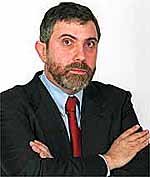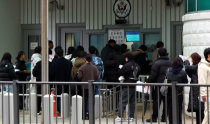Out of the loop

I`m starting to get worried about Alan Greenspan.
I`m not talking about his role in the tax cut debate — though the tone at recent Congressional events suggests that few now perceive him as standing above the political fray. What worries me is that he may be getting behind the curve on his proper job, the management of the economy.
In his testimony on monetary policy Wednesday, Mr. Greenspan made his trademark argument: technology has changed the ground rules. The key sentence was this: "The same forces that have been boosting growth in structural productivity seem also to have accelerated the pace of cyclical adjustment." Translation: don`t worry about the recent plunge in manufacturing — it`s just a matter of nimble firms, reflexes speeded up by information technology, moving quickly to get rid of excess inventories.
That`s probably a correct description of the slowdown so far. But the prospect that a quick recovery will automatically occur once those inventories are back to normal is looking more doubtful by the day.
Indeed, Mr. Greenspan`s testimony contained a crucial caveat: "The hastening of the adjustment to emerging imbalances is generally beneficial. . . . But the faster adjustment process does raise some warning flags . . . firms appear to be acting in far closer alignment with one another than in decades past." Translation: firms making investment decisions are starting to emulate the hair-trigger behavior of financial investors. That means a growing part of the economy may be starting to act like a financial market, with all that implies — like the potential for bubbles and panics.
One could argue that far from making the economy more stable, the rapid responses of today`s corporations make their investment in equipment and software vulnerable to the kind of self-fulfilling pessimism that used to be possible only for investment in paper assets like stocks. And there`s a pretty good case to be made that something like that is happening.
Last week, the Oracle Corporation, a leading supplier of business software that was expected to weather any slowdown easily — surely businesses wouldn`t stop investing in technology — startled the market by suddenly warning of disappointing sales: its customers are postponing orders at the last minute. Oracles are supposed to prophesy the future; and maybe this one has. In the last few weeks there has been a steady drumbeat of stories about businesses abruptly scaling back their investment plans, not because they are already hurting but because the developing climate of fear has convinced managers that it would be prudent to hunker down. And since one company`s investment is another company`s sales, such retrenchment can bring on the very slump that managers fear.
Which brings us to the Fed. Usually the Fed moves in a rather stately fashion; the Federal Open Market Committee, which sets interest rates, meets only about once every six weeks, and moves rates in modest steps. It makes an exception only for financial panics: the Greenspan Fed has been well aware that such panics can turn into self-fulfilling prophecies, and must be countered quickly.
Right now, seeing no evidence for a classic financial panic, the Fed has resisted calls for another emergency interest-rate cut. It is concerned, rightly, that it not be seen as reacting to every wiggle in the Nasdaq. But what if the new economy can have the functional equivalent of a financial panic, not in the financial markets but in business investment? Then the Fed`s determination not to be rushed might turn out to be a big mistake.
Military theorists like to talk about the "OODA loop" — that`s "observe, orient, decide, act." If you can get inside your enemy`s loop, reacting more quickly to the changing situation, you win. When it comes to stabilizing the economy, of course, we have met the enemy and he is us — our own propensity to irrational exuberance and self-fulfilling panic.
Mr. Greenspan`s reputation rests on his success in getting inside the economy`s loop in crises past. But thanks to the technological changes he extols, the economy`s reactions have gotten faster. It seems like a long time until that next F.O.M.C. meeting.
So has the economy gotten inside Mr. Greenspan`s loop? Maybe it`s time for him to observe, orient, decide — and act.
(http://www.nytimes.com/2001/03/04/opinion/04KRUG.html?searchpv=site01)






![노동신문 개방? 노동신문 서버는 개방을 견뎌낼까?[주성하의 ‘北토크’]](https://dimg.donga.com/c/138/175/90/1/wps/NEWS/IMAGE/2025/12/26/133032325.1.jpg)
